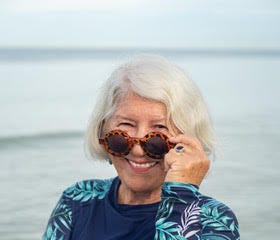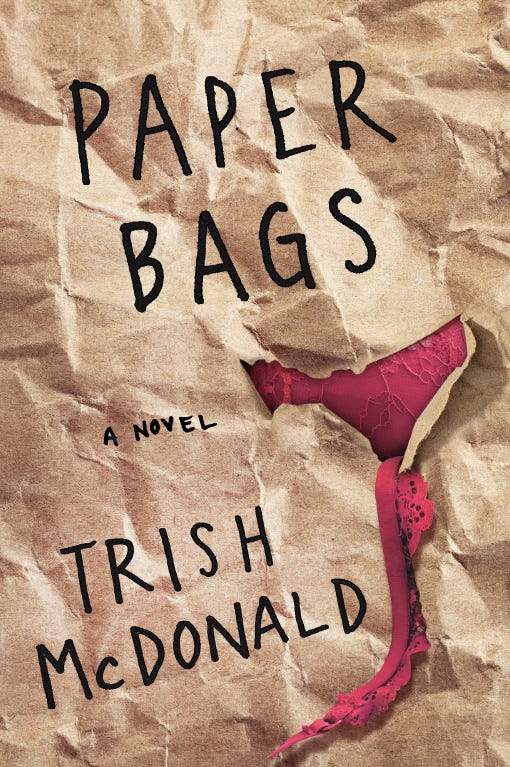This is 77: Debut Novelist Trish McDonald Responds to The Oldster MagazineQuestionnaire
"Aging has given me the courage to put my writing out in the world."
From the time I was 10, I’ve been obsessed with what it means to grow older. I’m curious about what it means to others, of all ages, and so I’ve started “The Oldster Questionnaire.”
Here, Trish McDonald—author of the novel Paper Bags, in which a cisgendered older woman falls in love with a trans woman—responds. - Sari Botton
How old are you?
77
Is there another age you associate with yourself in your mind? If so, what is it? And why, do you think?
When I dream, I’m a teenager. In my mind, I’m still a kid. If I move quickly past a mirror and only catch a flash, I’m lithe and limber, gliding even as I walk. Recent photos confuse me—is that how I really look?
Why does my mind say young, but a photo something else? There’s a need to be relevant, to be seen as inspiring, to have value in a world that treasures youth, beauty, and money. What better reason to live in my mind.
In my novel, Paper Bags, I tell a trans love story from the POV of a cisgender woman who has fallen in love with a ramblin’ man with secrets.
Do you feel old for your age? Young for your age? Just right? Are you in step with your peers?
Staying active helps me think and feel young. I swim, lift weights, play pickleball, teach line dancing, kayak, play mah jongg, and write.
Research on aging today uses different methods of computing age: Chronological and biological. I use a biological clock which puts me closer to 73—approximately 3.8 yrs. less than my chronological age. The research is fascinating and it’s all based on lifestyle i.e. exercise, food choices, sleep.
What do you like about being your age?
As a writer, I like to think being in my seventies gives me an edge. Maybe I can be forgiven if I make a blunder on social media because well, you know—her age…
Or in my novel, Paper Bags, where I tell a trans love story from the POV of a cisgender woman who has fallen in love with a ramblin’ man with secrets. Using curiosity and wonder, a 77-year-old woman explores gender, and through her questions, builds a bridge to open a dialogue about gender equality.
What is difficult about being your age?
The hardest part of being in my seventies is the ticking clock. When I was querying a literary agent, he quipped, “Everything has an expiration date.” Zing, I flinched. I had been hoping my age wouldn’t come up. So I did the only thing I know how to do: I made it my motto: There’s No Expiration on Dreams!
The hardest part of being in my seventies is the ticking clock. When I was querying a literary agent, he quipped, “Everything has an expiration date.” Zing, I flinched.
What is surprising about being your age, or different from what you expected, based on what you were told?
I would have never guessed how huge the disconnect is between how old you feel and reality. Maybe that’s why I cling to biological clocks and research giving me feedback that says I can literally reverse aging. Sure, I know the inevitable, but I’m an optimist and I’m already on to my next book.
What has aging given you? Taken away from you?
Aging has given me the courage to put my writing out in the world. I got the chance and I said yes. Paper Bags is an important story that has not been told from this POV. Aging gave me permission to write it.
Imagine if I had started writing fiction in my fifties. For those who think a debut at fifty is out of the ordinary, I’d give anything to be fifty and writing fiction for the next 27 years.
How has getting older affected your sense of yourself, or your identity?
My confidence has soared as I’ve gotten older. I’m not so worried about what others think as I have in the past. I’ve become more comfortable in my own skin.
Research on aging today uses different methods of computing age: Chronological and biological. I use a biological clock which puts me closer to 73—approximately 3.8 yrs. less than my chronological age.
What are some age-related milestones you are looking forward to? Or ones you “missed,” and might try to reach later, off-schedule, according to our culture and its expectations?
Writing a book on gender, sexuality, and cultural expectations at my age is such a nonconformist act that I have completely distanced myself from any milestones except for this fact—I published a novel!
What has been your favorite age so far, and why? Would you go back to this age if you could?
I’d go back to being a teenager in a flash. In fact, in my mind, I am one. So, I’m a writer, I live in my mind. But I would not go back as a cheerleader—I’d play a sport like lacrosse or maybe even rugby.
Is there someone who is older than you, who makes growing older inspiring to you? Who is your aging idol and why?
Any writer in their eighties is my hero. As we age, it becomes harder to pull out the words. I have to use a thesaurus to help me. I’m in awe of the beautiful prose of anyone my age or older because I know how difficult it is.
What aging-related adjustments have you recently made, style-wise, beauty-wise, health-wise?
I’m pretty regimented in my lifestyle with exercise, diet, sleep, and water. I know the odds are in my favor if I stay healthy, and I’d love to write another book or two.
What’s an aging-related adjustment you refuse to make, and why?
When people say, “I’m too old to learn this or that,” I cringe. When I teach a new line dance, I have to learn the steps, figure out which foot to start on, and hit the down beat all at the same time. I’ve seen research that says you can diminish your chances of dementia with dancing. I’m not giving it up anytime soon. I will never give up learning.
What’s your philosophy on celebrating birthdays as an adult? How do you celebrate yours?
We like to celebrate with dinner at a fancy restaurant. My beau might bake me a cherry or blueberry pie and then there’s dancing. Celebrations always include dancing.
With a background in nutrition education, Trish McDonald combines fiction and self-help in powerful scenes using science-based methods of body work: a yoga class, cranial sacral therapy session, reiki, music, and dancing. It is, however, the healing power of love and intimacy where her protagonist’s journey leads to self-discovery and acceptance. An education writer, McDonald’s credits include national publications, Family Circle President’s Award for nutrition programs, and various academic journal articles. An avid camper, McDonald lives in a RV park in Southwest Florida. Paper Bags is her first novel.






